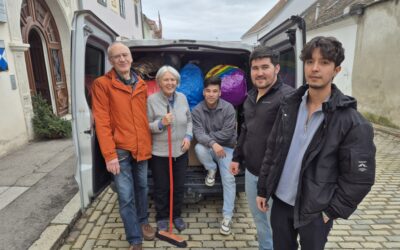 Fraternity, in this case, is not “a romantic or solely religious value, but an appeal to the intelligence, a concrete project that accepts the risk of history,” of a country, of Brazil, which is “marked by serious inequalities, but also emerging as a country that occupies a strategic position in the world.” These were the opening words of Jesuit Pedro Rubens, Rector of UNICAP describing the significance of the Chair. Prof Paolo Muniz, Director of the Asces Faculty (the project partner) added: “These universities now turn their reflection and research to the work of Chiara Lubich who, aside from being a great spiritual leader, is also an inspirer of a new light that illuminates all fields of human knowledge.” Focolare president, Maria Voce was invited to give the opening address at the event, which was the heart of her visit to Brazil. During her presentation she described the anthropological vision of the human person that emerges from the spirituality of Chiara, which is firmly rooted in Scripture. Voce began by asking who the human person is. In answering this question, she examined the dynamic of Love in the Triune God, the reflection of this love in human life and in the cosmos and the call to be “Love-in-relation”. She recalled that “we are, if we are the other” which means “being empty of ourselves,” “total gift of ourselves.” The lifestyle that springs from this dynamic provides the “fertile ground for authentic humanism, concrete fraternity.” The Bishop of Palmares, Dom Gerival Saraiva, highlighted the social dimension of knowledge, which can be understood in more concrete terms thanks to projects such as this.
Fraternity, in this case, is not “a romantic or solely religious value, but an appeal to the intelligence, a concrete project that accepts the risk of history,” of a country, of Brazil, which is “marked by serious inequalities, but also emerging as a country that occupies a strategic position in the world.” These were the opening words of Jesuit Pedro Rubens, Rector of UNICAP describing the significance of the Chair. Prof Paolo Muniz, Director of the Asces Faculty (the project partner) added: “These universities now turn their reflection and research to the work of Chiara Lubich who, aside from being a great spiritual leader, is also an inspirer of a new light that illuminates all fields of human knowledge.” Focolare president, Maria Voce was invited to give the opening address at the event, which was the heart of her visit to Brazil. During her presentation she described the anthropological vision of the human person that emerges from the spirituality of Chiara, which is firmly rooted in Scripture. Voce began by asking who the human person is. In answering this question, she examined the dynamic of Love in the Triune God, the reflection of this love in human life and in the cosmos and the call to be “Love-in-relation”. She recalled that “we are, if we are the other” which means “being empty of ourselves,” “total gift of ourselves.” The lifestyle that springs from this dynamic provides the “fertile ground for authentic humanism, concrete fraternity.” The Bishop of Palmares, Dom Gerival Saraiva, highlighted the social dimension of knowledge, which can be understood in more concrete terms thanks to projects such as this.  The thought of Chiara Lubich has been the object of study and research in several universities, and in several different academic areas. The Focolare founder received 16 honorary doctorates and degrees, the 1996 UNESCO Peace Education Award, and the 1998 European Council’s Human Rights Award. In honour of the occasion, Cidade Nova published a new book entitled: Fraternidade e Humanismo: uma leitura interdisciplinare do pensamento de Chiara Lubich (Fraternity and Humanism: an interdisciplinary approach to the thought of Chiara Lubich). For further reading: Opening Address by Maria Voce in Italian At the Catholic University of Recife, the Chiara Lubich Chair for fraternity and humanism – Radio Vaticana Universidades lançam Cátedra sobre fraternidade e humanismo – Cidade Nova UNICAP cria a catedra Chiara Lubich de fraternidade e humanismo – Rede Globo http://www.catedrachiaralubich.org/ Follow the journey on the Mariapolis Journal – login required
The thought of Chiara Lubich has been the object of study and research in several universities, and in several different academic areas. The Focolare founder received 16 honorary doctorates and degrees, the 1996 UNESCO Peace Education Award, and the 1998 European Council’s Human Rights Award. In honour of the occasion, Cidade Nova published a new book entitled: Fraternidade e Humanismo: uma leitura interdisciplinare do pensamento de Chiara Lubich (Fraternity and Humanism: an interdisciplinary approach to the thought of Chiara Lubich). For further reading: Opening Address by Maria Voce in Italian At the Catholic University of Recife, the Chiara Lubich Chair for fraternity and humanism – Radio Vaticana Universidades lançam Cátedra sobre fraternidade e humanismo – Cidade Nova UNICAP cria a catedra Chiara Lubich de fraternidade e humanismo – Rede Globo http://www.catedrachiaralubich.org/ Follow the journey on the Mariapolis Journal – login required
Want the good of others
Want the good of others




0 Comments